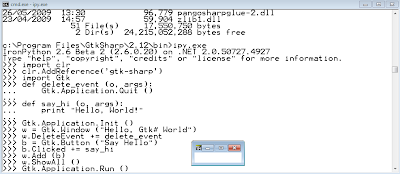A Good Mix 20: Startup time, inline C#, Global.asax in ASP.NET, an interactive shell in the web, Gtk# and more

Another collection of blog entries and projects related to IronPython and the Dynamic Language Runtime. IronRuby 0.9 starts 6 times faster than IronPython 2.6B1, why is that? Does anyone know? IronPython 2.0 is significantly slower to start than CPython, which is an issue for those writing command line tools and full applications in IronPython. IronPython 2.6 improves the situation, but as the lament in this short blog entry expresses it is still slow even when compared to IronRuby: IronRuby 0.9 starts 6 times faster than IronPython 2.6B1 Why is that? Don’t they use the same DLR engine? If IronPython started the same way, probably I would not use ‘CPython plus .Net exposed through MSFT Com’ technique. It is just unfair. On the usual support channel ( Twitter ) Dino Viehland explained that the IronPython interpreter does a bunch of work at startup time that IronRuby doesn't. On startup the interpreter imports the site module site just like CPython (and IronPython uses site.py from ...